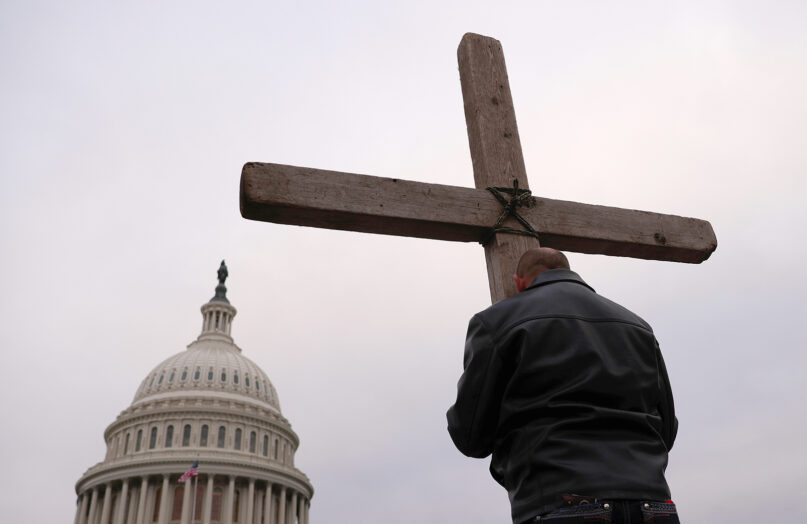(RNS) — “The conservative political project is no longer specifically Christian,” Nate Hochman announced in The New York Times last week.
According to Hochman, a fellow at National Review, the leadership of that project has passed to a new secular right more concerned with identity politics, critical race theory, immigration and the teaching of American history than with abortion and homosexuality, issues that have animated the religious right for decades.
I have my doubts.
To be sure, the Republican coalition has become somewhat more secular over the past decade. Where just 7% of Mitt Romney voters in 2012 were nones (those who answer “none” when pollsters ask their religion), they made up 13% and 14% of Donald Trump voters in 2016 and 2020, respectively. Meanwhile, the proportion of white evangelicals in the GOP presidential coalition dropped from 40% in 2012 to 34% in 2016 and 2020.
But the idea that the conservative torch has been passed to a new secular force in American politics seems wrong. Rather, what we’re seeing is the latest iteration of the religious movement that got under way nearly half a century ago.
That movement began in the 1970s as a series of isolated campaigns against the Equal Rights Amendment, gay rights, public school textbooks and abortion. What welded it into a national enterprise was a coordinated and ultimately triumphant effort of evangelical leaders and Republican Party operatives to turn white evangelicals into the GOP base.
Two decades ago I exchanged emails with an evangelical woman in suburban Atlanta who happened to be a Democrat. Here are a few examples of what she had to say.
The “in crowd” at my church is all Republican and regularly encourage others in the church to attend the Christian Coalition meetings and rallies. They also ask for volunteers to help them in the election campaigns of Republican candidates. The Deacons and Pastor invite Republican candidates to come speak at our church, but never invite Democrats …
In all meals or meetings in the Church Fellowship Hall, whenever talk turns to politics and current affairs, the Church leaders always point out that the Republican Party is the one that represents “Christian values” and “Christian people” should always support them. During the Clinton presidency, there were 8 years of demonizing him and all things Democratic. If I ever spoke up in defense of a Democratic politician, I was talked down and sometimes actually yelled at by red-faced Deacons saying that the Democrats are the work of the devil. Whenever I tried to point out church is not the appropriate place for secular politics, I’ve also been pooh-poohed…
[M]any politically unsophisticated Christians allow themselves to be told how to vote by “wolves in sheep’s clothing.”… It is now commonly accepted in the Christian community that the Republican Party is the Christian political party … Because I am a Democrat, I have actually been pulled aside by fellow church members and told I’d better not let people in my church know that!
In “How Politics Poisoned the Evangelical Church,” a story in this month’s Atlantic, staff writer Tim Alberta, who grew up an evangelical preacher’s kid in Michigan, put it this way: “I’ve spent my life watching evangelicalism morph from a spiritual disposition into a political identity. It’s heartbreaking.”
This morphing was sufficiently complete to render unnecessary the marquee outfits that used to bestride the religious right like colossi — Jerry Falwell Sr.’s Moral Majority, Pat Robertson’s Christian Coalition and James Dobson’s Focus on the Family. A dozen years ago the tea party burst onto the political scene as a tax protest, but it was populated largely by white evangelicals out of the religious right.
It’s worth recalling that the religious right has never limited itself to religious issues. “Listen America!,” Falwell’s 1980 Moral Majority manifesto, had chapters backing small government and national defense before it got around to opposing feminism, abortion, homosexuality and pornography.
The trick has always been to turn secular issues into religious ones, to sacralize them in a way that ensures that partisan politics is understood as holy war. Concern about the environment becomes the pagan worship of Gaia. Recognition of transgender identity becomes a threat to the way God made us. Mandated vaccination becomes a threat to religious liberty.
It can of course be asked whether the religious right was ever “specifically Christian.” Maybe it was. But if so, it’s no less Christian today.






